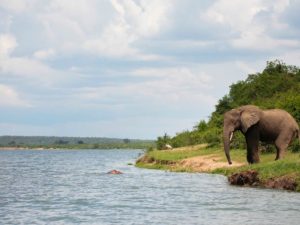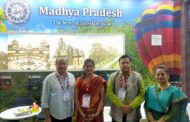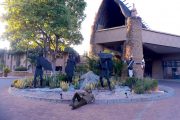 The growth of tourism in Uganda over the last few decades has inevitably had an effect on the environment. Through education and increased awareness about responsible tourism practices, the industry is trying to keep its impact to an absolute minimum. The list of ecotourism experiences in Uganda is long; from gorilla trekking in Bwindi national park, to bird watching tropical forests and the unspoilt marshlands that accommodate a variety of butterflies and rare species of birds. You also have nature safaris in Budongo forest reserve, to eco-lodges in Bwindi impenetrable national park. Ecotourism in Uganda contributed to the preservation of the natural environment of several National Parks, by making nature itself the asset of the touristic enterprise.
The growth of tourism in Uganda over the last few decades has inevitably had an effect on the environment. Through education and increased awareness about responsible tourism practices, the industry is trying to keep its impact to an absolute minimum. The list of ecotourism experiences in Uganda is long; from gorilla trekking in Bwindi national park, to bird watching tropical forests and the unspoilt marshlands that accommodate a variety of butterflies and rare species of birds. You also have nature safaris in Budongo forest reserve, to eco-lodges in Bwindi impenetrable national park. Ecotourism in Uganda contributed to the preservation of the natural environment of several National Parks, by making nature itself the asset of the touristic enterprise.
Ecotourism in Uganda is unrivalled when it comes to the diversity of wildlife. The country is home to vast tropical forests, dramatic mountains, heart-stopping beauty, and breath-taking experiences. It possesses some of the Africa’s tallest mountains, tropical forests, swamps and impressive waterfalls. In addition, this country has 10 national parks, 3 UNESCO World Heritage Sites and countless spectacularly beautiful regions. It is the ideal destination for nature lovers. In such a huge and diverse country, conservation is paramount.
 Ecotourism, to the tourism stakeholders and communities in Uganda, is an important and practical tool -an efficient way to add economic value to threatened natural areas and cultural sites. Ecotourism is not just about social, economic and environmental benefits; it’s also, just about fun. Companies offer and promote a selection of the best nature tours from across the country meaning that travelers can experience and enjoy the best of Uganda, while at the same time having the peace of mind that their stays and activities leave a minimal footprint and contribute to conservation efforts and the local economy.
Ecotourism, to the tourism stakeholders and communities in Uganda, is an important and practical tool -an efficient way to add economic value to threatened natural areas and cultural sites. Ecotourism is not just about social, economic and environmental benefits; it’s also, just about fun. Companies offer and promote a selection of the best nature tours from across the country meaning that travelers can experience and enjoy the best of Uganda, while at the same time having the peace of mind that their stays and activities leave a minimal footprint and contribute to conservation efforts and the local economy.
It is almost impossible to separate a tourism experience in Uganda from a nature experience. So rich is the country in scenic beauty and wildlife, that these facets remain the strongest motivation for overseas tourists to visit Uganda. No trip to the country would be complete with visits to cities or created resorts only; visitors flock to better-known scenic regions and insist on a visit to a game park. And there is still a wealth of lesser-known areas to discover. Come and commute with nature, appreciate and enjoy her awesome gifts and be at one with the scenery.
Rwenzori Mountains
Rwenzori Mountain is a very famous region located in south western Uganda and has been declared as a UNESCO heritage site and extremely favorite among environmentalists. The area is quite recommended for ecotourism as you will enjoy the natural beauty in it, in addition to culture and histories adorn unparalleled scenery, beautiful waterfalls, prehistoric jungle scenery and a glacier valley.
Primate Trekking
![]() Mgahinga Gorilla National Park and Bwindi national park-a UNESCO World Heritage site, along the south western part of the country, are the premier places for Gorilla trekking while in Uganda. Venturing into the jungle in search of apes is among the top tourist activities in Uganda, home to Africa’s two remaining populations of the highly endangered mountain gorilla. Mgahinga also harbors the golden monkey. Alternatively, track chimpanzees in the Kibale, Queen Elizabeth and Murchison Falls national parks as well as grey checked mangabay in Mabira forest reserve and other primates in Semuliki national park.
Mgahinga Gorilla National Park and Bwindi national park-a UNESCO World Heritage site, along the south western part of the country, are the premier places for Gorilla trekking while in Uganda. Venturing into the jungle in search of apes is among the top tourist activities in Uganda, home to Africa’s two remaining populations of the highly endangered mountain gorilla. Mgahinga also harbors the golden monkey. Alternatively, track chimpanzees in the Kibale, Queen Elizabeth and Murchison Falls national parks as well as grey checked mangabay in Mabira forest reserve and other primates in Semuliki national park.
Bird watching
Uganda is home to more than 1,000 different species of birds. Bird watching is a popular ecotourism activity because major roads connect all of Uganda’s towns. This increases the ability for tourists to access the best bird watching areas. Some popular areas to explore include the Murchison Falls, Kibale forest national park, Semliki, Bwindi Impenetrable and Queen Elizabeth national parks. Look out for a shoe bill if you plan to visit Lake Mburo national park and Mabamba swamp in Entebbe. To increase your chances of seeing many birds take a boat ride on one of the Lakes.
Nature Safaris
 Many nature safaris in Uganda take place in western part of the country. It is a land of great diversity, with a mountainous region, Gorges, tropical forests, Rivers and lakes. Eco-tourists often travel to Bwindi to partake in gorilla trekking, Kibale for bird watching and chimpanzee tracking, Queen Elizabeth for game viewing and cruising opportunities on Kazinga channel. The Bigodi swamp is a sanctuary for vegetation, birds and primate life. Kidepo valley and Mount Elgon National Parks also offer plenty of opportunities for exploration and discovery. Elgon mountain caldera is among the largest calderas in the world.
Many nature safaris in Uganda take place in western part of the country. It is a land of great diversity, with a mountainous region, Gorges, tropical forests, Rivers and lakes. Eco-tourists often travel to Bwindi to partake in gorilla trekking, Kibale for bird watching and chimpanzee tracking, Queen Elizabeth for game viewing and cruising opportunities on Kazinga channel. The Bigodi swamp is a sanctuary for vegetation, birds and primate life. Kidepo valley and Mount Elgon National Parks also offer plenty of opportunities for exploration and discovery. Elgon mountain caldera is among the largest calderas in the world.
Eco-Lodges
An eco-lodge can be a great place to stay while on an eco- adventure trip to Uganda. Eco-lodges vary in style, ranging from small and quaint, to large and spacious. Stay in an eco-lodge and enjoy the merging of the outdoors with the indoors, as lodge owners often use fallen trees and other types of foliage to decorate the indoors. Choose from a wide range of environmental friendly lodging options including the Clouds Mountain Gorilla Lodge in Bwindi Impenetrable Forest National Park, Semliki Safari Lodge in Semliki Valley Wildlife Reserve and Budongo Eco Lodge in Murchison Falls National Park.
Mabira Forest Reserve
Mabira tropical rainforest located in Mukono district is inhabited by hundreds of species of animals, plants, reptiles, amphibians and mammals, certainly very interesting for lovers of natural beauty. This forest covers a vast area and is full of natural wealth that will make you come back refreshed after visiting the place; an ecotourism destination is quite amazing and very interesting to visit.














































